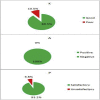Knowledge, attitudes, and practices of the general population about Coronavirus disease 2019 (COVID-19): a systematic review and meta-analysis with policy recommendations
- PMID: 33962095
- PMCID: PMC7988473
- DOI: 10.1016/j.puhe.2021.03.005
Knowledge, attitudes, and practices of the general population about Coronavirus disease 2019 (COVID-19): a systematic review and meta-analysis with policy recommendations
Abstract
Objectives: This study aimed to investigate and synthesize the current evidence on knowledge, attitudes, and practices (KAPs) of the general population regarding COVID-19.
Study design: This is a systematic review and meta-analysis.
Methods: We conducted a systematic search on PubMed/LitCovid, Scopus, and Web of Sciences databases for papers in the English language only, up to 1 January 2021. We used the Joanna Briggs Institute checklist developed for cross-sectional studies to appraise the quality of the included studies. All stages of the review conducted by two independent reviewers and potential discrepancies were solved with a consultation with a third reviewer. We reported the result as number and percentage. A meta-analysis conducted using a random effect model with a 95% confidence interval.
Results: Forty-eight studies encompassing 76,848 participants were included in this review. 56.53% of the participants were female. The mean age of the participants was 33.7 years. 85.42% of the included studies were scored as good quality, 12.50% as fair quality, and the remaining (2.08%) as low quality. About 87.5% examined all three components of the KAPs model. The knowledge component was reported as good and poor in 89.5% and 10.5% of the included studies, respectively. Of the studies that examined the attitude component, 100% reported a positive attitude. For the practice component, 93.2% reported satisfactory practice, and 6.8% poor practice. The result of the meta-analysis showed that the overall score of KAPs components about COVID-19 were 78.9, 79.8, and 74.1, respectively.
Conclusions: This systematic review and meta-analysis showed that the overall KAP components in the included studies were at an acceptable level. In general, knowledge was at a good level, the attitude was positive and practice was at a satisfactory level. Using an integrated international system can help better evaluate these components and compare them between countries. PROSPERO REGISTRATION CODE: (CRD42020186755).
Keywords: Attitude; COVID-19; Knowledge; Policy recommendations; Practice; Systematic review.
Copyright © 2021 The Royal Society for Public Health. Published by Elsevier Ltd. All rights reserved.
Figures





References
Publication types
MeSH terms
LinkOut - more resources
Full Text Sources
Other Literature Sources
Medical

